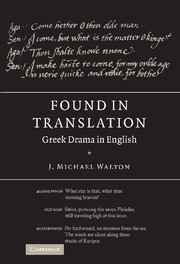Book contents
- Frontmatter
- Contents
- Acknowledgements
- Introduction: ‘Summon the Presbyterians’
- 1 Finding Principles, Finding a Theory
- 2 Historical Perspectives: Lumley to Lennox
- 3 Aeschylus and the Agamemnon: Gilding the Lily
- 4 Translating the Mask: the Non-Verbal Language
- 5 Sophocles' Oedipus Tyrannus: Words and Concepts
- 6 Text and Subtext: From Bad to Verse
- 7 Euripides' Medea and Alcestis: From Sex to Sentiment
- 8 The Comic Tradition
- 9 Modernising Comedy
- 10 When is a Translation Not a Translation?
- Appendix: A Comprehensive List of all Greek Plays in English Translation
- Notes
- Select Bibliography
- Index of Translators
- General Index
1 - Finding Principles, Finding a Theory
Published online by Cambridge University Press: 04 December 2009
- Frontmatter
- Contents
- Acknowledgements
- Introduction: ‘Summon the Presbyterians’
- 1 Finding Principles, Finding a Theory
- 2 Historical Perspectives: Lumley to Lennox
- 3 Aeschylus and the Agamemnon: Gilding the Lily
- 4 Translating the Mask: the Non-Verbal Language
- 5 Sophocles' Oedipus Tyrannus: Words and Concepts
- 6 Text and Subtext: From Bad to Verse
- 7 Euripides' Medea and Alcestis: From Sex to Sentiment
- 8 The Comic Tradition
- 9 Modernising Comedy
- 10 When is a Translation Not a Translation?
- Appendix: A Comprehensive List of all Greek Plays in English Translation
- Notes
- Select Bibliography
- Index of Translators
- General Index
Summary
The theorists, like Gibbon's Byzantine heretics, contradict one another at every turn; and what is worse, they show the most lamentable discrepancies between theory and practice.
(Peter Green, ‘Some versions of Aeschylus’, Essays in Antiquity, London, 1960)In a recent book on translation for the stage the Finnish scholar Sirkku Aaltonen made a welcome attempt to show how and why translation theory may meet some of the concerns expressed by Peter Green forty years earlier in his essay about translations of Aeschylus. That translators from the classics should have proved wary of modern theoretical formulae which appeared to offer a general analysis of the processes involved in transferring material from a source into a target language is unsurprising. Just as much suspicion has been accorded by those who translate for the stage who point out, with reason, that the translating of a play is no more than an early station in a progress which ends up, via directors, designers and players, as a new artistic entity. The position of the classical play, a tragedy by Aeschylus, Sophocles or Euripides, or a comedy by Aristophanes or Menander, involves leaps of faith and imagination and a whole new series of definitions. Green's conclusion that ‘Translation is not, at any level, an ideal art; it is a crutch for human infirmity’ does at least help to focus the mind on what happens in the process of taking the text of a Greek tragedy from the fifth century bc and renewing it for a reader in the twenty-first century ad, never mind for a contemporary audience.
Information
- Type
- Chapter
- Information
- Found in TranslationGreek Drama in English, pp. 9 - 25Publisher: Cambridge University PressPrint publication year: 2006
